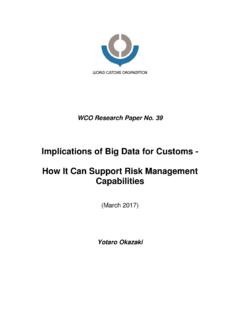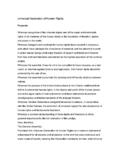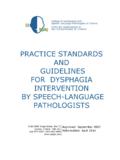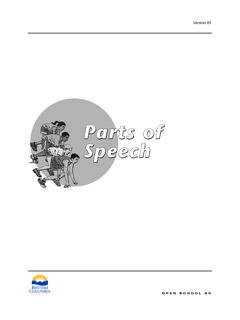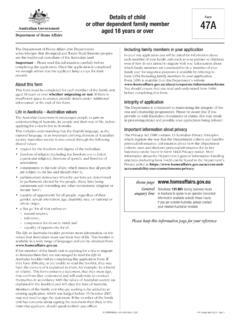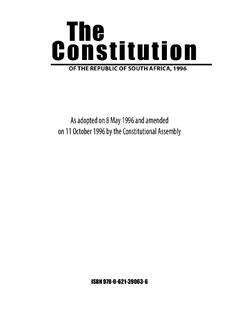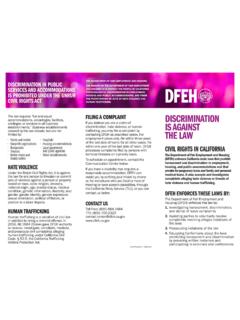Transcription of Rules of Origin - Manual / Handbook
1 1 Rules of Origin - Handbook Rules of Origin are now more topical than ever. They have become a very prominent feature of today s trading system and various regional trade agreements are being negotiated across the globe. While negotiations are going on to harmonize the non-preferential Rules of Origin , the proliferation of preferential trade agreements represents an important concern in terms of customs revenues. The Rules of Origin enable the preferential agreements to be correctly implemented, which promotes the development of trade and encourages investment. The aim of this Handbook is to enhance the understanding and correct application of Rules of Origin . 2 Background Political situation in the WTO Committee on Rules of Origin (CRO) In 1995 the World Trade Organization (WTO) was established via the so-called Marrakech Agreement. One of the annexes to the Marrakech Agreement is the WTO Agreement on Rules of Origin (part of the Annex 1A: Multilateral Agreements on Trade in Goods).
2 The Agreement on Rules of Origin aims at harmonizing the non-preferential Rules of Origin , outlines general principles for the making of Rules of Origin and established two committees, the Committee on Rules of Origin (CRO) and the Technical Committee on Rules of Origin (TCRO). The WTO Members have agreed on the overall agreement and on the exclusion of preferential Origin from the harmonization. The process of the Harmonization Work Programme concerning non-preferential Rules of Origin has been ongoing since 1995 with an initial deadline for the work to be finalized in 1998. The TCRO deals with certain technical aspects of the Rules but does not have the power to conduct real negotiations. The TCRO completed the technical examination in May 1999 and 486 open issues were sent to the CRO for a more political discussion. In July 2002, 348 out of these 486 issues (72 %) were approved by the CRO and 138 issues were still to be resolved. Among the remaining 138 issues, 93 core policy issues were identified for discussion and decision at the level of the General Council.
3 These significant trade policy issues were thought to be too difficult to be dealt with at the Committee level. The CRO recommended that the General Council focus on the following 12 crucial issues: Implication issue: the implication of the implementation is thought to be a major problem. This concerns the scope of implementation of the agreement on Rules of Origin . The problem is whether the Rules of Origin shall be applied for all purposes prescribed in Article 1 of the agreement or optionally applied. The implication issue is relevant for anti-dumping measures, Origin marking, safeguards etc. Up to now, this issue is deemed to be major barrier to finishing the negotiations. Fishing in the Exclusive Economic Zone (EEZ) Value added Rules Slaughtering Blending of wine or alcohol Milk powder (does the Origin depend on the milk itself or is transformation into powder enough?) Coffee roasting (is roasting enough or does the Origin go with the green beans?)
4 Production of wine and fruit juices Ottawa language Dyeing or printing for yarn and fabrics (main focus of dyeing and printing of textile products issue is whether Origin will be given to the country which operated dyeing or printing or given to the country which produced yarns or fabrics) Refining of oil Assembly of machines, vehicles and watches (machinery is one of the main issues) 3 The outstanding issues are mainly in the categories of agricultural products, chemicals, textiles and machinery. Footwear has not been well proceeded either. Informally, though, the CRO has approached an agreement on many issues. An additional problem is the high rates for agricultural products and textile products these products are very important for developing countries. Negotiations and opinions depend on where a given country is in the process. In informal consultations the Chairperson of the CRO is currently trying to get consensus of the remaining technical issues.
5 The General Council has asked the CRO to resolve as much as possible within the technical issues and decided to study the question of implications of the WTO Agreement on Rules of Origin on the other WTO Agreements. In October 2011 the CRO decided to mandate the WTO Secretariat to initiate the transposition of the results of the Harmonization Work Programme to more recent versions of the HS nomenclature (a so-called technical rectification) and to complete the transposition exercise as soon as possible. The work needs to be gradual; that is, move step by step from one version of the HS to the other (1996, 2002, 2007 and 2012). The initiation of the transposition exercise should not disrupt the continuation of the CRO s technical discussions regarding the harmonization of the non-preferential Rules of Origin . Trends for the future WTO perspectives In his keynote speech at the WCO Council in June 2011, Mr. Pascal Lamy, Director-General of the WTO, highlighted preferential Rules of Origin as an area of critical importance.
6 He noted that as long as the Origin of a good has a great impact on the duties to be collected, the door is open to fraud. He added that the solution could be to kill the Rules of Origin , but that there is a need for these Rules in other aspects of trade. Therefore, simplification is the way forward, especially for developing countries. Mr. Pascal Lamy focused on the WTO initiative Made in the World and stated that at present, international trade flows are computed by attributing the full commercial value of a product to the last country of Origin . This needs to change as business increasingly locates the different stages of its activities in a way that optimizes its value-addition chain. Therefore, trade flows should be measured in value added instead of gross numbers as it is the case today. While the WCO recognizes that the new global production chains might give birth to a need for new trade analysis, it is also clear that the WTO initiative is an academic and statistical exercise which serves a different purpose than that of customs administrations.
7 Measuring trade in value added can be used by countries in their international trade negotiations and might give a more nuanced and balanced calculation of trade balances, but this does not change the Origin criteria for imported or exported goods. 4 Countries might wish to renegotiate the Rules of Origin in their Free Trade Agreements (FTAs) in order to take account of the changes in the production lines, but Rules of Origin will still be needed for the customs clearance at the same level as the classification and the valuation of the good. Moreover, the negotiations on the harmonization of non preferential Rules of Origin among WTO members clearly show the difficulties for the parties to agree on Origin criteria adapted to the actual global production. Proliferation of Free Trade Agreements Rules of Origin are now more topical than ever. They have become a very prominent feature of today s trading system and various regional trade agreements are being negotiated across the globe.
8 The Rules of Origin enable the preferential agreements to be implemented, which promotes the development of trade and encourages investment. At present more than 300 free trade agreements are in force around the world and around 100 more are in the stage of negotiation or ratification. The increasing growth in the number of preferential trade agreements with their manifold Rules of Origin is a source of concern for WCO Members and private operators. The application of Rules of Origin should not create new administrative burdens neither for international trade operators nor for Customs administrations. On the contrary, simplification measures should be investigated. In respect of the spirit of the Kyoto Convention a balance should be struck between the needs of Customs administrations and the measures to facilitate trade. The proliferation of preferential trade agreements and the replacement of unilateral market access for developing countries with reciprocal market access within the framework of Economic Partnership Agreements represent an important concern in terms of customs revenues for developing countries.
9 Therefore, the need for technical assistance in the administration and management of Rules of Origin both in preferential and non-preferential areas is increasing and the activities carried out by the WCO Secretariat are getting more and more significant. As part of the WCO Origin Action Plan, the WCO has developed a database of free trade agreements and a comparative study on preferential Rules of Origin . Certificates of Origin Preferential certificates of Origin are delivered by the competent authorities of countries or entities having signed a preferential trade agreement. However, delivery of certificates of Origin requires: - legal ability to deliver certificates of Origin - good knowledge of the Rules conferring Origin to the goods - powers to inflict sanctions on Origin offences. There is no standardization in the way to use and apply preferential Origin evidence and significant differences exist for the issuance of preferential Origin evidence which can be done by Customs, Ministries of Trade, Industry, Commerce or Agriculture etc.
10 , authorized exporters, other private bodies or authorities or in some countries by Chambers of Commerce. 5 Exporters may also be allowed to declare the Origin of the goods for example for frequent consignments of a certain amount on the invoice itself. The management of documentary evidence of Origin remains an issue of the sovereign states which is outlined in the individual preferential trade agreements. The harmonization of non-preferential Rules of Origin is not yet completed and there is, thus, no international instrument to handle documentary evidence in the domain of non-preferential Origin . This means that the probative value of non-preferential Origin evidence cannot be guaranteed and the certification of non-preferential Origin by a country can merely serve as an indication for other countries, since each country maintains its own non-preferential Rules . The current economic situation has prompted countries and private companies to rethink the way to do business.


